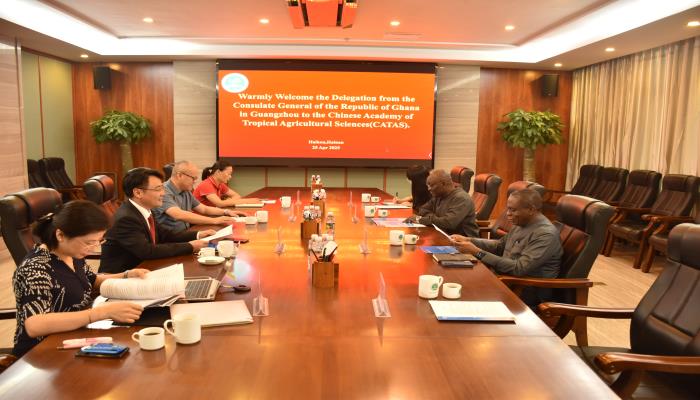On April 25, a delegation from the Consulate General of Ghana in Guangzhou, led by H.E. Mr. Sidney Ellis, Consul General, paid a special visit to the Chinese Academy of Tropical Agricultural Sciences (CATAS) and held discussions on tropical agricultural cooperation. Li Jihua, Vice President of CATAS, attended the dialogue/symposium.

Symposium and Exchanges
At the symposium, Vice President Li Jihua extended a warm welcome to the Ghanaian delegation and gave a detailed introduction to the achievements of CATAS in international scientific and technological cooperation. He stated that tropical agriculture plays a vital role in global food security and economic development, and CATAS attaches great importance to agricultural cooperation with tropical countries worldwide. Since its establishment in 1954, CATAS has made numerous groundbreaking scientific research achievements in the field of tropical agriculture, actively participated in international cooperation in tropical agriculture, helped developing countries enhance their agricultural science and technology capabilities, and contributed Chinese wisdom and solutions to addressing global tropical agricultural challenges. Ghana is located in the tropical zone, and the agricultural industry is the foundation of its economy. He expressed hope that the two sides could further strengthen exchanges and cooperation in tropical agricultural science and technology. He specifically proposed facilitating the signing of a Memorandum of Understanding (MoU) with Ghana’s national-level scientific research institutions with the assistance of the Consulate General, and integrating bilateral scientific and technological collaboration into Ghana’s governmental agricultural development plans to provide policy support for subsequent pragmatic cooperation.
H.E. Mr. Sidney Ellis, Consul General, spoke highly of the achievements made by CATAS. He mentioned that as a tropical country, Ghana has significant development potential in crops such as cassava, coffee, and cocoa, but still faces some challenges in technology and scientific research. He hoped to take this visit as an opportunity to identify more potential areas for cooperation with CATAS, further discuss cooperation pathways and directions, and leverage CATAS’s scientific research strength to boost Ghana’s tropical agricultural capabilities and promote the sustainable development of its agricultural industry.
Relevant personnel from the International Cooperation Office, Tropical Crop Variety and Germplasm Resources Institute, and Spice and Beverages Research Institute of CATAS attended the symposium.


